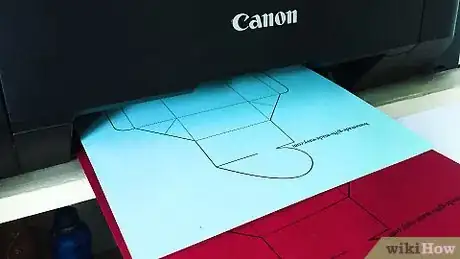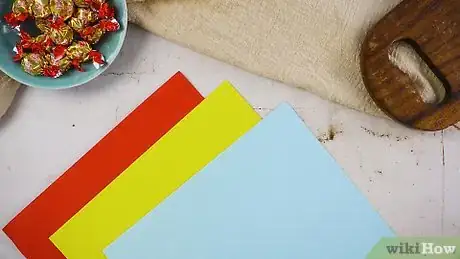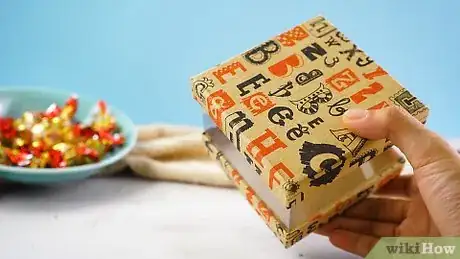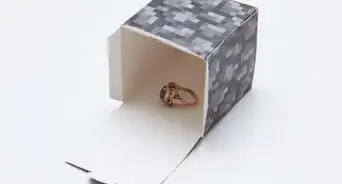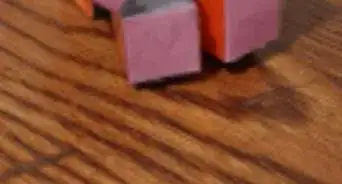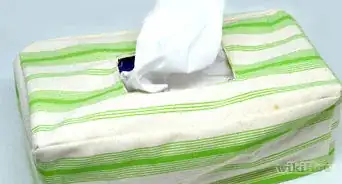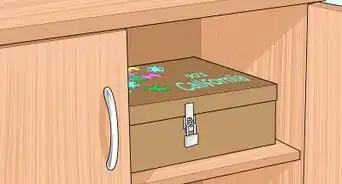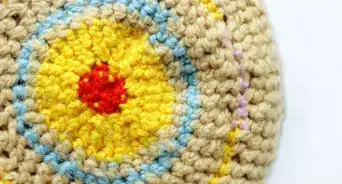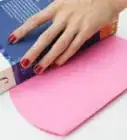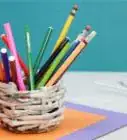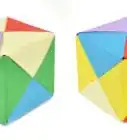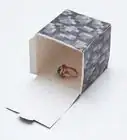This article was co-authored by wikiHow staff writer, Eric McClure. Eric McClure is an editing fellow at wikiHow where he has been editing, researching, and creating content since 2019. A former educator and poet, his work has appeared in Carcinogenic Poetry, Shot Glass Journal, Prairie Margins, and The Rusty Nail. His digital chapbook, The Internet, was also published in TL;DR Magazine. He was the winner of the Paul Carroll award for outstanding achievement in creative writing in 2014, and he was a featured reader at the Poetry Foundation’s Open Door Reading Series in 2015. Eric holds a BA in English from the University of Illinois at Chicago, and an MEd in secondary education from DePaul University.
There are 7 references cited in this article, which can be found at the bottom of the page.
The wikiHow Video Team also followed the article's instructions and verified that they work.
This article has been viewed 58,994 times.
Learn more...
Chocolates are a great gift. They’re perfect for romantic occasions, holidays, or party bags, and almost everyone enjoys a sweet treat. But part of the experience comes from unwrapping or unboxing a gift to find out what’s inside. While there’s nothing wrong with using the packaging the chocolates came in, making your own box is a great way to take your gift to the next level. You can either make a box from scratch by printing a template out online, or dress up a preconstructed cardboard box to make a stronger box for your chocolates.
Steps
Folding a DIY Gift Box
-
1Find a printable template online to make things easy. Designing a box from scratch is kind of complicated, but there are hundreds of free templates out there in a variety of unique designs. From regular old boxes to heart-shaped boxes and pillow pouches, there are plenty of templates to choose from. Find a box that looks interesting to you.[1]
- Take the shape of your chocolate into account. If you’re gifting longer bars, a rectangular box is ideal. For little chocolate balls or bites, basically any sized box will work, although cubes and pillow boxes look great.
-
2Print the template out on colorful cardstock or paper. Grab some colorful cardstock. If you have a high-end printer that can print on cardstock, print the template directly on the cardstock. If you don’t have a printer that can print on thicker paper, just print out the template on regular paper and glue it on the backside of some nice cardstock.[2]
- You can always pull a template up on your screen and draw it out or trace it on your computer screen if you don’t have a printer.
Advertisement -
3Cut the solid lines of the template out with a utility knife or scissors. Cut around the external lines that make the shape of the box. Either use scissors and carefully cut around the lines, or put the paper down on a cutting board and use a straight edge and a utility knife to cut each line out perfectly.[3]
- Leave any solid lines inside of the template where they are. These lines are typically reserved for tabs that you fold into other portions of the box and adhere to them with glue.
- If you’re making a pillow pouch or heart-shaped box, you probably have a few curved lines to cut out. Trimming these lines with a utility knife is extremely difficult, so you’re better off using scissors for these.
Tip: Cutting the box out with a utility knife will result in cleaner lines, but this takes much longer than just cutting around the lines with scissors. Still, if you have a steady hand, scissors are a fine option.
-
4Score the dotted lines with a non-serrated butter knife. To score the dotted lines inside of the template, grab a soft-edged butter knife and a straight edge. Set the paper down on a cutting board and line the edge of the straight edge up with the dotted line. Then, drag the butter knife along the line to put an indentation in the paper. This will make the sections much easier to fold.[4]
- If you don’t score the lines, your box will have a kind of puffy shape and may unfold on its own. Scoring these lines improves the shape of the box and reduces the overall tension.
-
5Fold the box into its general shape by folding along the scored lines. This process looks different for each style of box, so follow the template’s instructions on the site you pulled it from. Generally speaking, you fold each solid line inside of your template to make the tabs and gently fold along each scored line to assemble the box inward.[5]
- This process is typically easier for simple boxes and pillow pouches. The heart-shaped boxes and complex shapes can take a few attempts to get right.
-
6Put glue or double-sided tape on the foldable tabs. Once you have the shape of the box mostly assembled, grab a glue stick or a roll of double-sided tape. Apply a small length of glue or double-sided tape to each tab on the side where it faces another portion of your box.[6]
- You can also use standard single-sided tape to attach the tabs where they lay over another portion of the box. Just keep in mind that these pieces of tape will be visible when someone opens the box.
-
7Press the tabs against the adjacent walls of your box to secure them. Take your first tab and line it up with the wall of the box it attaches to. Gently press the tab against the paper to permanently attach it to your box. Repeat this process for every tab you have until the shape of your box is assembled.[7]
-
8Add a bow, design, or stickers to customize the box. Once your box is folded, you can add any optional designs. Custom stickers are a great option if you’re gifting the chocolates to someone since you can put their name or a cute note on the sticker. Bows, ribbons, string, and fake flowers are also great options.[8]
- You can always leave the box as it is. You don’t have to add anything to it if you don’t want to.
Dressing up a Prefabricated Box
-
1Get a cardboard box big enough to fit your chocolates. A small shoebox is great for a large amount of chocolate, while a large matchbox is great for 2-3 smaller, fancier chocolates. Basically any small cardboard box with a lid will work. If you’re assembling a lot of boxes to give chocolates to a bunch of people, pick up some small cardboard boxes from a hobby or big box store.[9]
Tip: You can always use an old chocolate box. Just take out that plastic packaging that held the individual chocolates in place to keep the old chocolate’s residue and odor from ruining your delicious treat.
-
2Wrap the box in wrapping paper to give it a neat texture or pattern. Pull out a roll of wrapping paper. Set the box down with the opening facing up and cut out a section of the wrapping paper big enough to cover the sides of the box. Put tape or glue on the bottom and sides of the box and fold the paper up to the fit the box. Tuck the corners in and tape them in place, and use scissors to trim off any excess paper.[10]
- Repeat this process with the lid to cover each portion of the box with your paper.
- If you don’t like the glossy texture of wrapping paper, buy some butcher paper.
- You can do this by printing out a pattern on printer paper if you have a smaller box.
- You can paint the box if you’d like, but painted cardboard boxes tend to look kind of cheap compared to paper-based options.
-
3Cut shapes out and tape them to the box if you’d like. To give the box some personality, cut out some hearts, labels, or shapes. Tape or glue them to your box to add some additional design elements. Use cardstock or glossy paper if you want to give the shapes some texture or weight.[11]
- This is a great way to give each box an individual touch if you’re giving out a large number of boxes to coworkers, friends, or family.
-
4Add bows, strings, or ribbons to give the box a personal touch. A bow is a great choice if you’re giving a romantic gift or giving the chocolates out as a holiday gift. String or twine is a more modern option and will give your box a more elegant look. Ribbons are a great middle ground if you just want to add some color and style.[12]
- You can wrap a single string or ribbon around the middle of the box, or wrap the box vertically in both directions to give the gift receiver something to open.
Packing the Chocolates
-
1Line the inside with tissue or shredded paper to protect the chocolates. To keep the chocolate from getting dinged up inside of the box, stuff the inside with balled up tissue paper. For a trendier look, pick up some shredded paper and line the inside of your box with it. Set your wrapped chocolates on top of the shredded or tissue paper.[13]
- Do not pack unwrapped chocolates on the paper. Your delicious treats will pick up all kind of junk and dust from the paper.
-
2Cut some small compartments out of cardboard strips for multiple chocolates. Get 2 thin cardboard strips that will fit inside your box. Cut a slit in the middle of each strip. Then, place your first strip in the middle of the box with the slit facing up. Take your second cardboard strip and slide it into the first strip so that the slits fit together. Place your wrapped chocolates in the compartments to separate them.[14]
- You can buy these compartment liners if you prefer. Just make sure the divider will fit inside your box.
- You can also do this with 4 strips for a 3 by 3 grid if you have a bigger box.
-
3Place a single chocolate inside each box for a simple gift. If you have a bunch of smaller boxes or you’re only giving out a little token of gratitude, just put a single chocolate inside each box. This is a great option if the chocolates are really fancy or you have a lot of gifts to give out.[15]
-
4Use cupcake liners to present a large number of chocolates. If you have a bigger box and you’re giving out chocolates for everyone to share, get some mini cupcake liners. These are the small paper wrappers with ridges used for muffins, cupcakes, and peanut butter cups. Place 1 wrapped or unwrapped chocolate in each cupcake liner and arrange the chocolates in rows to share them.
- If you do this, make sure you keep the box upright at all times as you’re transporting it. The chocolates will fly all over the place if you don’t handle the box with care.
Things You’ll Need
Folding a DIY Gift Box
- Printer
- Printer paper
- Template
- Scissors
- Utility knife
- Glue or double-sided tape
- Bow, twine, stickers (optional)
Dressing up a Prefabricated Box
- Cardboard box
- Wrapping paper or butcher paper
- Scissors
- Tape
- Bow, twine, stickers (optional)
Packing the Chocolates
- Tissue paper or shredded paper
- Cardboard strips
- Scissors
- Cupcake liners
References
- ↑ https://www.homemade-gifts-made-easy.com/making-gift-boxes.html
- ↑ https://www.homemade-gifts-made-easy.com/making-gift-boxes.html
- ↑ https://www.homemade-gifts-made-easy.com/making-gift-boxes.html
- ↑ https://www.homemade-gifts-made-easy.com/making-gift-boxes.html
- ↑ https://www.homemade-gifts-made-easy.com/making-gift-boxes.html
- ↑ https://www.homemade-gifts-made-easy.com/making-gift-boxes.html
- ↑ https://www.homemade-gifts-made-easy.com/making-gift-boxes.html
- ↑ https://www.diys.com/homemade-gift-boxes/
- ↑ https://www.bobvila.com/slideshow/17-creative-ways-to-reuse-cardboard-boxes-47420#diy-postcards
